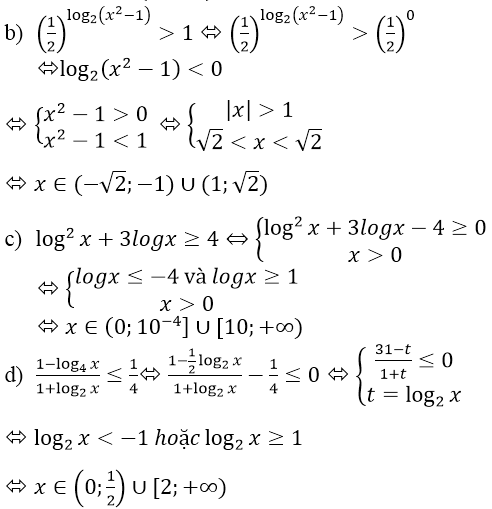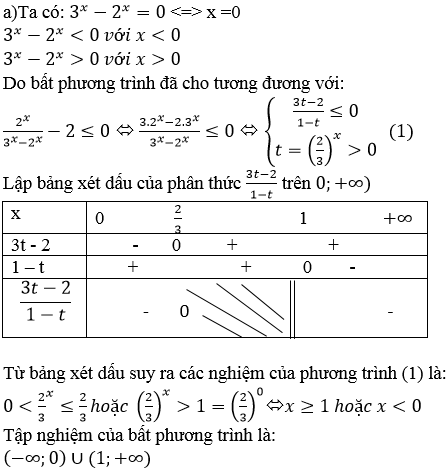Giải phương trình : \(\log^2_{\frac{1}{2}}x^2-\log_4x^4-20=0\)
ND
Những câu hỏi liên quan
Giải phương trình:
\(\log^2_{\dfrac{1}{5}}x^2+\log_5x+2=0\)
Câu 11: Nghiệm của phương trình \(\log^2_{\frac{1}{2}} (x-2)-(2-x)\log_{2} (x-2)+3(x-5)=0\) là?
Giải phương trình :
\(2\log^2_2x-14\log_4x+3=0\)
Điều kiện để phương trình có nghĩa: x > 0.
Biến đổi phương trình như sau:
\(2\log_2^2x-14\log_{2^2}x+3=0\)
\(\Leftrightarrow2\log_2^2x-14.\dfrac{1}{2}\log_2x+3=0\)
\(\Leftrightarrow2\log_2^2x-7\log_2x+3=0\)
\(\Leftrightarrow\left[{}\begin{matrix}\log_2x=3\\\log_2x=\dfrac{1}{2}\end{matrix}\right.\)
\(\Leftrightarrow\left[{}\begin{matrix}x=2^3\\x=2^{\dfrac{1}{2}}\end{matrix}\right.\)
\(\Leftrightarrow\left[{}\begin{matrix}x=8\\x=\sqrt{2}\end{matrix}\right.\)
(Cả hai nghiệm đều thỏa mãn)
Đúng 0
Bình luận (0)
giải các phương trình sau
a) \(\log_3\left(2x-5\right)=3\)
b) \(\log_4x^2=2\)
c) \(\log_7\left(3x-1\right)=\log_7\left(2x+5\right)\)
d) \(\ln\left(4x^2+2x-3\right)=\ln\left(3x^2-3\right)\)
e) \(\log\left(2x+3\right)=log\left(1-3x\right)\)
a: ĐKXĐ: \(x\notin\left\{\dfrac{5}{2}\right\}\)
\(\log_32x-5=3\)
=>\(log_3\left(2x-5\right)=log_327\)
=>2x-5=27
=>2x=32
=>x=16(nhận)
b: ĐKXĐ: x<>0
\(\log_4x^2=2\)
=>\(log_4x^2=log_416\)
=>\(x^2=16\)
=>\(\left[{}\begin{matrix}x=4\left(nhận\right)\\x=-4\left(nhận\right)\end{matrix}\right.\)
c: ĐKXĐ: \(x\notin\left\{\dfrac{1}{3};-\dfrac{5}{2}\right\}\)
\(\log_7\left(3x-1\right)=\log_7\left(2x+5\right)\)
=>3x-1=2x+5
=>x=6(nhận)
d: ĐKXĐ: \(x\notin\left\{1;-1;\dfrac{-1+\sqrt{13}}{4};\dfrac{-1-\sqrt{13}}{4}\right\}\)
\(ln\left(4x^2+2x-3\right)=ln\left(3x^2-3\right)\)
=>\(4x^2+2x-3=3x^2-3\)
=>\(x^2+2x=0\)
=>x(x+2)=0
=>\(\left[{}\begin{matrix}x=0\\x+2=0\end{matrix}\right.\Leftrightarrow\left[{}\begin{matrix}x=0\left(nhận\right)\\x=-2\left(nhận\right)\end{matrix}\right.\)
e: ĐKXĐ: \(x\notin\left\{-\dfrac{3}{2};\dfrac{1}{3}\right\}\)
\(log\left(2x+3\right)=log\left(1-3x\right)\)
=>2x+3=1-3x
=>5x=-2
=>\(x=-\dfrac{2}{5}\left(nhận\right)\)
Đúng 1
Bình luận (0)
Giải các bất phương trình sau :
a) \(\dfrac{2^x}{3^x-2^x}\le2\)
b) \(\left(\dfrac{1}{2}\right)^{\log_2\left(x^2-1\right)}>1\)
c) \(\log^2x+3\log x\ge4\)
d) \(\dfrac{1-\log_4x}{1+\log_2x}\le\dfrac{1}{4}\)
Giải mỗi phương trình sau:
a) \({\log _5}\left( {2x - 4} \right) + {\log _{\frac{1}{5}}}\left( {x - 1} \right) = 0\)
b) \({\log _2}x + {\log _4}x = 3\)
a)
ĐK: \(\left\{{}\begin{matrix}2x-4>0\\x-1>0\end{matrix}\right.\Leftrightarrow x>1\)
\(\log_5\left(2x-4\right)+\log_{\dfrac{1}{5}}\left(x-1\right)=0\\ \Leftrightarrow\log_5\left(2x-4\right)-\log_5\left(x-1\right)=0\\ \Leftrightarrow\log_5\left(\dfrac{2x-4}{x-1}\right)=\log_51\\ \Leftrightarrow\dfrac{2x-4}{x-1}=1\\ \Leftrightarrow2x-4=x-1\\ \Leftrightarrow x=3\left(tm\right)\)
Vậy x = 3.
b) ĐK: x > 0
\(\log_2x+\log_4x=3\\ \Leftrightarrow\log_2x+\dfrac{1}{2}\log_2x=3\\ \Leftrightarrow\left(1+\dfrac{1}{2}\right)\log_2x=3\\ \Leftrightarrow\dfrac{3}{2}\log_2x=3\\ \Leftrightarrow\log_2x=2\\ \Leftrightarrow x=4\left(tm\right)\)
Vậy x= 4
Đúng 1
Bình luận (0)
Giải các bất phương trình lôgarit sau :
a) \(\dfrac{\ln x+2}{\ln x-1}< 0\)
b) \(\log^2_{0,2}x-\log_{0,2}x-6\le0\)
c) \(\log\left(x^2-x-2\right)< 2\log\left(3-x\right)\)
d) \(\ln\left|x-2\right|+\ln\left|x+4\right|\le3\ln2\)
Giải các phương trình logarir sau :
a) \(lgx+lg\left(x+9\right)=1\)
b) \(\log_2x+\log_4x+\log_8x=11\)
c) \(\log_4x^3+3\log_{25}x+\log_{\sqrt{125}}\sqrt{x^3}=\frac{11}{2}\)
d) \(\log_2x+\log_3x+\log_4x=\log_{20}x\)
d) Điều kiện x>0. Áp dụng công thức đổi cơ số, ta có :
\(\log_2x+\log_3x+\log_4x=\log_{20}x\)
\(\Leftrightarrow\log_2x+\frac{\log_2x}{\log_23}+\frac{\log_2x}{\log_24}=\frac{\log_2x}{\log_220}\)
\(\Leftrightarrow\log_2x\left(1+\frac{1}{\log_23}+\frac{1}{2}+\frac{1}{\log_220}\right)=0\)
\(\Leftrightarrow\log_2x\left(\frac{3}{2}+\log_22-\log_{20}2\right)=0\)
Ta có \(\frac{3}{2}+\log_22-\log_{20}2>\frac{3}{2}+0-1>0\)
Do đó, từ phương trình trên, ta phải có \(\log_2x=0\) hay \(x=2^0=1\)
Vậy nghiệm duy nhất của phương trình là \(x=1\)
Đúng 0
Bình luận (0)
c) Điều kiện x>0, đưa về cùng cơ số 5, ta có :
\(\log_5x^3+3\log_{25}x+\log_{\sqrt{25}}\sqrt{x^3}=\frac{11}{2}\)
\(\Leftrightarrow3\log_5x+3\log_{5^2}x+\log_{5^{\frac{3}{2}}}x^{\frac{3}{2}}=\frac{11}{2}\)
\(\Leftrightarrow3\log_5x+3\frac{1}{2}\log_5x+\frac{3}{2}.\frac{2}{3}\log_5x=\frac{11}{2}\)
\(\Leftrightarrow\frac{11}{2}\log_5x=\frac{11}{2}\)
\(\Leftrightarrow\log_5x=1\)
\(\Leftrightarrow x=5^1=5\) thỏa mãn
Vậy phương trình chỉ có 1 nghiệ duy nhất \(x=5\)
Đúng 0
Bình luận (0)
b) Điều kiện x>0. Đưa về cùng cơ số 2, ta có :
\(\log_2x+\log_{2^2}x+\log_{2^3}x=11\Leftrightarrow\log_2x+\frac{1}{2}\log_2x+\frac{1}{3}\log_2x=11\)
\(\Leftrightarrow\frac{11}{6}\log_2x=11\)
Do đó \(\log_2x=6\)
và \(x=2^6=64\)
Vậy phương trình có nghiệm duy nhất là \(x=64\)
Đúng 0
Bình luận (0)
Xem thêm câu trả lời
Đề bài
Giải mỗi bất phương trình sau:
a) \({3^x} > \frac{1}{{243}}\)
b) \({\left( {\frac{2}{3}} \right)^{3x - 7}} \le \frac{3}{2}\)
c) \({4^{x + 3}} \ge {32^x}\)
d) \(\log (x - 1) < 0\)
e) \({\log _{\frac{1}{5}}}(2x - 1) \ge {\log _{\frac{1}{5}}}(x + 3)\)
f) \(\ln (x + 3) \ge \ln (2x - 8)\)
\(a,3^x>\dfrac{1}{243}\\ \Leftrightarrow3^x>3^{-5}\\ \Leftrightarrow x>-5\\ b,\left(\dfrac{2}{3}\right)^{3x-7}\le\dfrac{3}{2}\\ \Leftrightarrow3x-7\le1\\ \Leftrightarrow3x\le8\\ \Leftrightarrow x\le\dfrac{8}{3}\\ c,4^{x+3}\ge32^x\\ \Leftrightarrow2^{2x+6}\ge2^{5x}\\ \Leftrightarrow2x+6\ge5x\\ \Leftrightarrow3x\le6\\ \Leftrightarrow x\le2\)
Đúng 0
Bình luận (0)
d, Điều kiện: x > 1
\(log\left(x-1\right)< 0\\ \Leftrightarrow x-1< 1\\ \Leftrightarrow1< x< 2\)
e, Điều kiện: \(x>\dfrac{1}{2}\)
\(log_{\dfrac{1}{5}}\left(2x-1\right)\ge log_{\dfrac{1}{5}}\left(x+3\right)\\ \Leftrightarrow2x-1\ge x+3\\ \Leftrightarrow x\ge4\)
f, Điều kiện: x > 4
\(ln\left(x+3\right)\ge ln\left(2x-8\right)\\ \Leftrightarrow x+3\ge2x-8\\\Leftrightarrow4< x\le11\)
Đúng 0
Bình luận (0)












